- Home
- Rose Tremain
The Way I Found Her
The Way I Found Her Read online
Table of Contents
Cover
About the Author
Also by Rose Tremain
Title
Copyright
Dedication
Acknowledgements
Part One
Part Two
Part Three
Epilogue
About the Author
Rose Tremain is a writer of novels, short stories and screenplays. She lives in Norfolk and London with the biographer Richard Holmes. Her books have been translated into numerous languages, and have won many prizes including the Orange Prize, the Whitbread Novel of the Year, the James Tait Black Memorial Prize, the Prix Femina Etranger, the Dylan Thomas Prize, the Angel Literary Award and the Sunday Express Book of the Year.
Restoration was shortlisted for the Booker Prize and made into a movie; The Colour was shortlisted for the Orange Prize and selected by the Daily Mail Reading Club. Rose Tremain’s most recent collection, The Darkness of Wallis Simpson, was shortlisted for both the First National Short Story Award and the Frank O’Connor International Short Story Award. Three of her novels are currently in development as films.
ALSO BY ROSE TREMAIN
Novels
Sadler’s Birthday
Letter to Sister Benedicta
The Cupboard
The Swimming Pool Season
Restoration
Sacred Country
Music & Silence
The Colour
The Road Home
Short Story Collections
The Colonel’s Daughter
The Garden of the Villa Mollini
Evangelista’s Fan
The Darkness of Wallis Simpson
For Children
Journey to the Volcano
THE WAY I FOUND HER
Rose Tremain
This ebook is sold subject to the condition that it shall not, by way of trade or otherwise, be lent, resold, hired out or otherwise circulated without the publisher’s prior consent in any form (including any digital form) other than this in which it is published and without a similar condition including this condition being imposed on the subsequent purchaser.
Epub ISBN: 9781446450598
Version 1.0
www.randomhouse.co.uk
Published by Vintage 1998
15 17 19 20 18 16 14
Copyright © Rose Tremain 1997
Rose Tremain has asserted her right under the Copyright, Designs and Patents Act 1988 to be identified as the author of this work
Fondation of Jacques Brel for permission to quote from ‘Ne me quitte pas’ by Jacques Brel
First published in Great Britain in 1997 by Sinclair-Stevenson
Vintage
Random House, 20 Vauxhall Bridge Road,
London SW1V 2SA
www.vintage-books.co.uk
Addresses for companies within The Random House Group Limited can be found at: www.randomhouse.co.uk/offices.htm
The Random House Group Limited Reg. No. 954009
A CIP catalogue record for this book is available from the British Library
ISBN 9780749396992
For RH,
who navigated along the route.
With love.
Part One
There are days when it feels really cold in here.
I’ll admit, I hope it doesn’t get much colder, because then I might have to move and I don’t want to move. I’m OK where I am. I like lying in the dark and listening to the wind.
I’ve begun to believe, anyway, that the cold comes from inside me, not from outside. Moving might not change a thing. Because it’s like some kind of frost has got into me. It’s forming icy crystals along my spine. It’s telling me that time is going along differently in me and making me old in the space of this one winter.
Not that I care, really. I don’t want to talk about the present. It’s Valentina I want to talk about. She’s the only subject that’s in my mind.
I think I’ll start with something else, though. I’ll start with the moment when I noticed that my mother had become a beautiful woman.
I once thought beauty was something only found in old paintings. It never really occurred to me that ordinary people could be beautiful, here and now. And then I saw – that day in July – that they could be and that my mother was one of them.
She was sitting in my room, by my window, trying to mend my Action Man, whose name was Elroy. Or at least, it had been Elroy. But now Elroy’s torso had parted from his pelvis, so I personally knew that he was dead and finished and I told Mum not to bother with him. I never played with him any more. But she took no notice of me. She just sat there, very intent, like a lacemaker or like a mathematician, with the sun on her crazy hair, trying to bring Elroy back into existence. And that’s when I noticed it: the fantastic, gorgeous beauty of my mother, Alice Little.
She was thirty-seven and I was thirteen. She’d had me when she was twenty-four. The birth had been easy, everyone said, because I was so small, such an absolute pune. I weighed about five pounds. In the photograph they took of me in the nursing home, I look like a piece of Play Doh. I’m amazed anyone wanted to keep me. Under the photograph, some nurse has written Baby Lewis, aged three days. It’s embarrassing to think I started out so pathetically. Luckily, parents don’t see you as you are. What they see is beauty.
It was the day before we left our house in Devon and went to Paris. I could describe it as the day before my real life began. Mum was wearing a little mauve skimpy top and a drapey kind of skirt she’d bought from an Indian shop. Elroy, in his Royal Marines uniform, lay on this skirt and his motionless blue eyes looked up at Mum’s hair, which is extremely startling kind of hair, like a red thorn tree. Her arms are freckled and she told me that when she was a little girl growing up in Scotland she used to believe that freckles were in the air, like snow, and fell on your arms and on your nose when you went roller-skating on summer afternoons. She used to try to wash them off in the bath with a loofah.
She had to give up on Elroy, as I knew she would. Everything plastic is difficult to mend. Nothing bonds with it. So I kicked him under my bed to lie in the darkness and dust and I thought, that darkness and dust that he’s lying in, there’s something else in it too: it’s the boy I was when I imagined Elroy was real.
On the plane taking us to Paris, I saw that other people had noticed Mum’s beauty. They sat in their blue-and-red airline seats, watching her. Not just the men. I saw the women wondering if her thorn-tree hair was really growing out of her scalp.
The man sitting next to Mum on the aisle side had been so disturbed by her that he was having difficulty opening the little foil packet of peanuts he’d been given with his drink. He began to tear at the peanut packet with his teeth. He tore so frantically that peanuts exploded over his drinks table and cascaded down into his silk-suited lap. He was Italian and he swore under his breath. Italian swearing sounds as if it’s the dirtiest language on earth, as if the swearer’s tongue is licking the grating over a drain.
Then I got out the brand-new notebook my father had given me before we left and wrote in it the first of all the things I came to write down in the coming weeks. The notebook was bought at the airport Smith’s and had a photograph of Concorde on it. ‘There you are, Lewis,’ my father had said: ‘Concorde.’ ‘Oh, great,’ I said. ‘Thanks. Brilliant.’ Except that we weren’t on Concorde. We were on some enormous jumbo plane about ten seats wide. The stewards wore draylon shirts. At the back was a gaggle of babies, mewling. It wasn’t the best place in the sky to be.
‘What are you writing?’ asked Alice.
‘Nothing much,’ I said. ‘Just a private theory.’
I called it Lewis Little’s Exploding Peanut Theo
ry of Beauty. Its first premise was: Beauty causes alteration. I’m talking about the beauty of women. Alteration may frequently result in some accident or other. These accidents might be small and of no significance (cf. the Italian in the aisle seat) or they might be important, even a life-or-death matter. Alice Little, my mother, has come into the category of beautiful women. (NB: she may have been there for a while without my noticing.) Ergo, it’s probable that she is going to be the cause of an accident of some kind in the near future. This probability is heightened by the fact that the near future is going to take place in Paris.
Ours wasn’t a family which ever did really interesting things. We would never have thought up the idea of going to Paris. We would have stayed in Devon that summer as usual and flown our bird kite on the windy cliffs and gone shrimping in rock pools.
But then came the call from Valentina. I answered the telephone one Sunday in May while Mum and Dad were in the pub and I was doing my history homework and Valentina said to me: ‘Listen, darling. I must have your mother here this summer. That’s it, you know. You must persuade her to come, Lewis. I’m sure she does everything you ask, because that is what the mothers of clever sons do. I’m counting on you.’
I used to be a very accommodating little boy. When I was still made of Play Doh, people were able to mould me to fit their whims and desires, but now I was going through a phase of disliking being counted on. So later I said to Mum, ‘Valentina wants you to go to Paris in the holidays, but I don’t want you to. Don’t go, will you?’
I remember that Mum sat down and took my hand and stroked it with the back of hers, like she was trying to snow me with freckles. ‘If I go,’ she said, ‘will you come with me?’
I’d been to Brittany once, but never to Paris. All I could remember of France was a high wind and a vast hotel and the salty smell of oysters. And I remembered Valentina. She’d been with us in the vast hotel and worn gold jewellery at breakfast. She’d been born in Russia, but had lived in Paris for thirty-eight of her forty-one years. She’d told me that her only memory of her Russian life was standing in a maize field and looking up at the moon.
‘Where would we live?’ I asked.
And then I was told that it was all already planned. This is what parents are in the habit of doing: they pretend to ask you a question when really they’re giving you an order.
Mum told me that Valentina had a huge apartment and we would stay there with her – just Mum and me. Dad didn’t want to come. He had a summer ‘project’. Dad was a school-teacher and the word ‘project’ gave him a kind of gladness of heart. But he wanted us to go. He was all for it, in fact. He told Mum that he thought it was a good idea to introduce me to a great European city.
I said: ‘What will I do in this great European city while you and Valentina are working?’
Still snowing my hand with freckles, Mum said: ‘Well, you’ll discover things. Your French is good and now you’ll be able to perfect it.’
‘Who will I perfect it with?’
‘I don’t know. Valentina’s friends. You’ll meet people your own age, too. And they play chess in the parks. You could talk to the chess players.’
‘Will they talk to me?’
‘I don’t know. I expect so.’
‘Will I be able to play chess with them?’
‘I can’t say. You’ll have to ask them.’
I looked at Alice and she was sweetly smiling, as if she were laughing at me or as if everything in the world were as easy as looking for shrimps in a pool. I wanted to tell her that I thought I’d feel stupid going round Paris begging people to talk to me or play games with me, but I didn’t. And then she took the hand that she was stroking and put it to her cheek and said: ‘We’ll watch over you. Of course we will.’
Before we left for Paris, my father, Hugh, had told me in confidence what his ‘project’ was. We were sitting on a cliff at the time, watching gulls circling in the air. Hugh said: ‘Lewis, I’m going to build a hut in the garden.’
He said this as if he were old Brunel about to start on the Clifton Bridge. He seemed to want me to marvel.
I don’t remember what I did say. Perhaps I just looked up at the birds, trying to think of something, and then Hugh went on: ‘It’s a secret between you and me, OK? I’m building it for Mum. We’ll put a desk and a chair in it. It’ll be a place where she can sit and read or work in the summer.’
I didn’t look at him. If I had looked at him, I would have seen a short, neat man with gentle brown eyes and thick hair just smartly flecked with grey. His mother, Gwyneth, was Welsh and his father, Bertie, English. With my mother being Scottish, I have the DNA of almost the whole of the British Isles sloshing round in my body, but I’ve wound up with the Welsh name Dad insisted on.
Dad loved the Devon cliffs. He kept pointing things out to me – tamarisk trees and standing stones and larks’ nests in the gorse and wild snapdragons. He’d pointed these things out about ninety-nine times. After a while, he said: ‘The thing is, I’ve never built anything in my life. I’ve got a DIY manual that makes it all look easy, but it almost certainly isn’t. So listen. If, when you come back from Paris, there’s absolutely no sign of a hut in the garden, don’t mention it in front of Mum, OK? I’ll invent another project – something to do with school. OK, Lewis? It might be because the hut has fallen down, or it might be that it’s simply proved too difficult.’
I said I thought a hut ought not to be too terribly hard, but Dad said you never really knew, in life, what was going to prove hard or prove easy. People’s assumptions about their own capabilities were often amazingly wrong.
I remember picturing the finished hut at the bottom of the garden, sort of red and oblong with one tiny window and a little squat roof. I thought it risked looking like a public toilet, or even a private outside toilet for us, like houses had in the old days, and I didn’t think Mum would want to go and work in an outside toilet, so I said: ‘Dad, wouldn’t a summerhouse be better than a hut?’ And he said yes, of course it would, and that maybe, in the autumn, that’s what we’d find there: a beautiful summerhouse with a wooden floor and an ironwork balcony and a weather vane on the top. But it was better not to imagine it.
My Paris room was a maid’s room in the roof of the apartment building. I don’t know why I’d been given it, because Valentina’s apartment was huge, with loads of rooms in it, but I had, and I didn’t mind; I enjoyed feeling that I was up there alone.
You reached my room by a little narrow staircase. The thing I really liked about it was that it had a round window, looking out on to the street, which was called the rue Rembrandt. I didn’t know whether, long ago, Rembrandt himself had come there and said in Dutch: ‘What a nice street! Please name it after me’, or whether he never set foot in it.
When I looked out of the round window, my head filled it up completely, as if the window had been measured for me by a person who made astronaut helmets. It was also positioned at exactly the right height for me, about five foot above the floor, so I could stick my face into it and examine the roofs opposite for as long as I wanted, and be perfectly comfortable.
As soon as I first saw these roofs on the other side of the rue Rembrandt, I realised they were different from English roofs. Nothing much ever seems to grow out of an English roof, but here there were dormers and balustrades and TV masts and chimney stacks and bits of ironwork and flowerpots and an ornamental gold cross, all sprouting out of the slate and jostling each other for space. So I got out my Concorde notebook and, leaving some blank pages in which to develop my Exploding Peanut Theory of Beauty, wrote down an instruction to myself to investigate the life of a Paris roof, inside and out. I put: NB: I am well placed to do this.
Next to my bedroom was a peculiar bathroom with a huge iron bath standing on claw feet in the middle of the floor. Valentina had said: ‘I had to put this bathroom in, darling, because of course nobody used to consider that maids needed to bathe. The smell of them must have been extremely discon
certing, mustn’t it?’
This bathroom was the chosen place for the overspill from Valentina’s wardrobe. I counted thirty-one dresses and evening gowns and nine coats, wrapped in polythene, hanging on a movable chrome rail. I wondered whether they were cast-offs or whether Valentina would sometimes come up to my bathroom in just a satin slip or something and choose a dress for the evening.
While I was counting the ball gowns, I found a door. It had been hidden by the clothes rail and it was locked and there was no key. I put my ear to the keyhole. I supposed that what the door led to was another maid’s room like mine, so I listened for the kind of sound I thought a maid might make; a sigh, for instance. But I couldn’t hear anything at all, and at this moment Valentina called up my stairs and said we were going out to supper.
I combed my hair and went down and stood at the door of the salon. The salon had a parquet floor with a gleam on it like on the surface of still water. And it was as if, suddenly, I didn’t dare to cross this water or thought I’d disturb it or muddy it or something and so I just stayed by the door, watching.
Valentina was alone in the room, sitting on a spindly sofa, smoking one of her Russian cigarettes. The cigarette was yellow. When she saw me hesitating, she held out her arm, which was plump and golden-skinned, and said: ‘Come on, darling. Come and tell me all the secrets of your life!’
I didn’t have any secrets. I felt like I was waiting and waiting for the day when my first secret was going to appear. And then, as I walked across the watery floor and the mingled smell of the yellow cigarette and Valentina’s expensive perfume wafted into my brain, I thought, this feels like the kind of place where this famous day might happen.
We didn’t go straight to a restaurant but walked into a park near Valentina’s flat called the Parc Monceau.
You can’t sit on the grass in Paris parks, so Mum and Valentina sat on a bench and I stood staring at the grass, admiring how green and shiny it was, as if it had been washed and combed by a hairdresser.

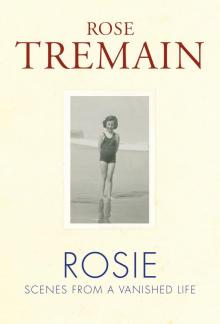 Rosie
Rosie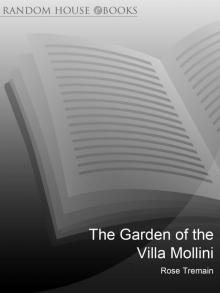 The Garden of the Villa Mollini
The Garden of the Villa Mollini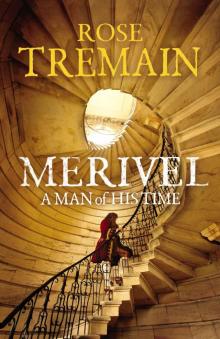 Merivel: A Man of His Time
Merivel: A Man of His Time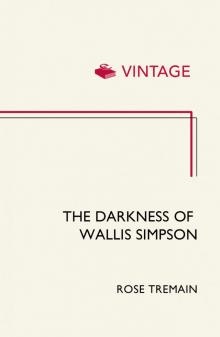 The Darkness of Wallis Simpson
The Darkness of Wallis Simpson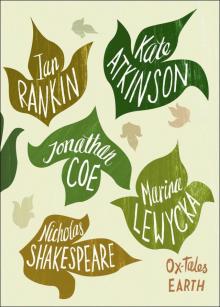 Earth
Earth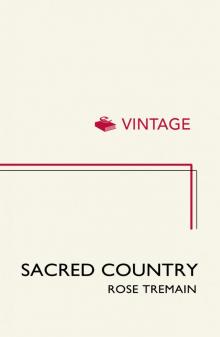 Sacred Country
Sacred Country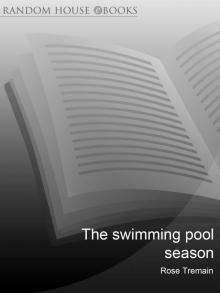 The Swimming Pool Season
The Swimming Pool Season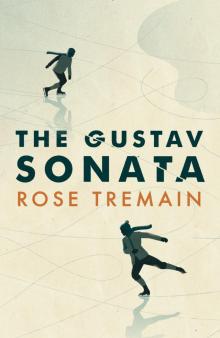 The Gustav Sonata
The Gustav Sonata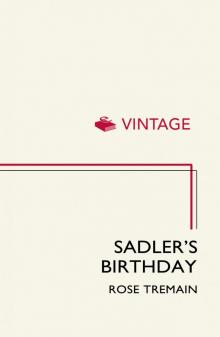 Sadler's Birthday
Sadler's Birthday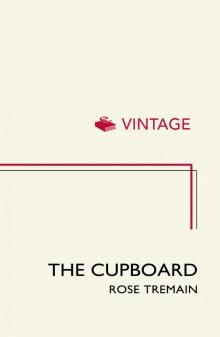 The Cupboard
The Cupboard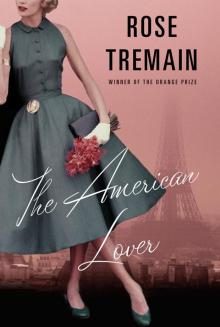 The American Lover
The American Lover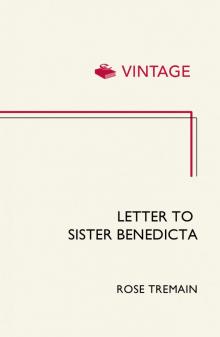 Letter to Sister Benedicta
Letter to Sister Benedicta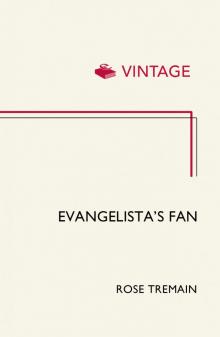 Evangelista's Fan
Evangelista's Fan Restoration
Restoration The Road Home
The Road Home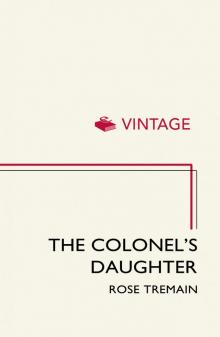 The Colonel's Daughter
The Colonel's Daughter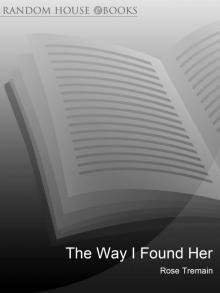 The Way I Found Her
The Way I Found Her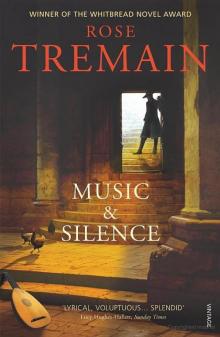 Music & Silence
Music & Silence